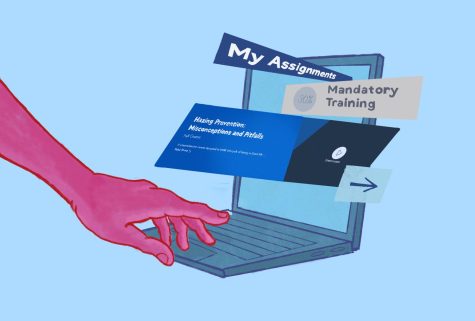This article will give you hazing training
April 6, 2023

In an attempt to engage the unresponsive student population, and at the direction of Student Affairs, this article will suffice as the REQUIRED anti-hazing education; The Wire has incredible readership numbers, especially the back page. Training commences below:
First: pre-assessment. This is a series of true or false statements.
-Hazing is very bad.
-Hazing is abuse.
-I feel meh about hazing.
-Hazing puts a smile on my face.
-Hazing is someone forcing you to do hyperrealistic Miss Piggy makeup on yourself but you’re really bad at makeup so somehow it’s even more disturbing than normal.
Now: a video with intro credits as long as an HBO production. About 60 percent of college students are subject to hazing, but definitely none of those students attend Whitman. Hazing can be physical and emotional abuse, typically done by the group to exert top-down power. For example, you are invited over to a team captain’s house for a party, and you bring Cool Ranch Doritos. When you walk in, everyone is wearing a mask with your face on it, and they demand you eat all the Doritos and address them with your own name. Super weird.
Next: is it hazing? Ask yourself these questions: Is the requirement abusive or harmful? Does it further the group’s mission and goals? Does it make someone a better member of the group (actually better, not just like mentally tougher because they were hazed for continuous days)?
Stop chewing those Cool Ranch Doritos. The answer is yes. Here’s how you can prevent hazing: don’t act like it’s okay — speak up and look out for your friends. One important step to preventing hazing is educating yourself. Take a little look-see on The Wire website, and just type in hazing …
That’s it. (Y/N) is herein dubbed trained in preventing hazing. All emails demanding you perform REQUIRED anti-hazing education will be declared null and void. Juli Dunn thanks you.





